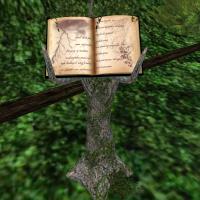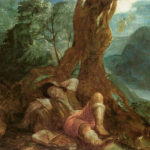Divination by Druids was to see the spiritual forces in the world, and it was often for healing. They didn’t see disease as a punishment from God that you should just take because you deserve it. They saw it as an imbalance. So any plague, or famine, or what not, was cause for divination, and based on what they were able to divine they would take corrective action. They weren’t fatalists by any means.
What were Druid circles? The circle, or the grove, was the meeting of Druids. It was more like a Native American medicine society than a church gathering. Druids would gather to share their activities and learning, and to discuss things affecting the land and people in general, and to perform their observances together. The ritual was sort of education as well as community affirming.
Were there women Druids? Yes. Membership in the Druid orders wasn’t exclusive to a sex, especially the order of Druids itself. Women Ovates were also quite common, but most Bards were men. The reason for Bards being men was they weren’t totally non militant. They could potentially be called on to sort of sheriff things, and being the public speakers they sometimes were also fighters.
People tended to not bother women Ovates as they were sort of scared of them. Their gift was “spooky”, but if they did disturb them the Bards would respond. If the Ovate didn’t handle it him or herself, Druids understood poison, and what not, pretty well. The last surviving order of Druids was the Bard. They were sort of militant holdouts, but because of their preservation of the lore and even undertaking to learn literacy, written records do exist. In a sense, the Druids never died. They have just evolved.
Today we say the pen is mightier than the sword. The Bards were pen and sword, and even the Japanese have a related saying. “Pen and sword in accord.” The ignorant warrior was not respected, nor seen as worthy of leadership. A chieftain often had a Bard as an advisor depending on circumstances, and the chieftains official role was to preserve the tribal law. This was supported by the Bard.
As for the order of Druid tribes, people often would never see a Druid. They did live alone, but the Bards always knew where they were, and would seek their council if something beyond their education arose. Honestly, we sort of isolate our scientists in the same way today do we not? Governments are very hush, hush, but they are the biggest supporters of research. Druids didn’t belong to the government. They stood outside of it, and is why they were trusted by every tribe.
To draw another appropriate parallel, the Druids were like the Magi, but instead rejected temporal authority except in their sacred land. You didn’t defy the Druids and go crashing into a forest they told you not to. You might never return if you did.
If you see that nature is the source of wisdom, and that you can learn anything that you need to know from it, philosophically, spiritually, or scientifically, it is not unreasonable to call yourself a Druid. They didn’t have a formal hierarchy, but they did recognize elders on the path. So if that path is yours, you might yourself seek an elder for guidance, though it isn’t necessary.
Your thoughts are welcome. May the road rise up to meet you, and the wind always be at your back.
Travis Saunders
Dragon Intuitive
~science,mysticism,spirituality~



